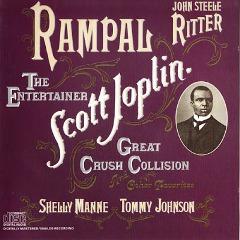Rampal plays Scott Joplin (1983)
Rampal plays Scott Joplin (1983)

01. Maple Leaf Rag 02. Elite Syncopations 03. Bethena [A Concert Waltz] 04. Combination March 05. Entertainer [A Ragtime Two Step] 06. Cascades [A Rag] 07. Cleopha [March and Two Step] 08. Ragtime Dance 09. Chrysanthemum [An Afro-American Intermezzo] 10. Favorite [Ragtime Two Step] 11. Original Rags 12. Harmony Club Waltz 13. Great Crush Collision March Jean-Pierre Rampal - Flute, Piccolo, Train Whistle, Whistle John Steele Ritter - Fortepiano, Harpsichord, Piano Shelly Manne - Bird Calls, Drums, Mouth Percussion, Percussion Thomas "Snake" Johnson – Tuba Gordon Gottlieb - Foot Stomping, Percussion
Jean-Pierre Rampal was one of history's greatest flute players, and among the most recorded classical artists of all time. His father was the first flutist of the Marseilles Symphony Orchestra and was professor of flute at the Conservatory there. Although his father taught him to play the flute, he did not recommend a musical career for Jean-Pierre, who instead entered medical studies. He was in the third year of medical study when, in 1943, German occupying forces drafted Rampal for service in the military. He learned that he was, in fact, to be sent to Germany as forced labor. So he went absent without leave and joined the underground, traveling to Paris and assuming a new identity. In Paris, he decided to attend the National Conservatory as a flute student. Five months later he graduated with first prize. Paris was liberated a few months later, and Rampal was appointed first flutist with the Paris Vichy Opéra.
In 1950 Rampal embarked on a touring career. His favored accompanist was Robert Veyron-Lacroix, who could play both piano and harpsichord. Veyron-Lacroix's expertise helped Rampal deepen his performances of music of the eighteenth century -- his favorite musical era -- by drawing on contemporary performance practices. He eschewed the vibrato and the generally romantic sound of most flute playing, and in so doing he strongly influenced flutists of subsequent generations. In 1956 he joined the orchestra of the Paris Opéra, remaining there through 1962. During this period he appeared frequently on the radio in Paris, gaining great popularity. He taught at the Paris Conservatory and gave master classes around the world.
Rampal was devoted to chamber music, founding the French Wind Quintet (Quintette à Vent Française) in 1945 and the Ensemble Baroque de Paris in 1953. He appeared with every major orchestra, gave recitals worldwide, and recorded prolifically, covering all of the standard flute repertoire and many new and unknown pieces. Several of his recordings have won the Grand Prix du Disques.
Even beyond these endeavors his musical interests were quite diverse: he also appeared on recordings of English folksong, American ragtime, European jazz, and Japanese, Chinese, and Indian classical music. Some of his recording partners were Mstislav Rostropovich, Claude Bolling, Ravi Shankar, and Isaac Stern. Numerous composers wrote works for him, including Francis Poulenc, Pierre Boulez, André Jolivet, and Jean Françaix. His Music, My Love: An Autobiography was published in 1989. Rampal received various honors, including elevation to the ranks of Chevalier of the Légion d'Honneur (1996), Officier des Arts et Lettres (1971), Commandeur de l'Ordre National de Mérite. He also received the Prix du Président de la République, and the Prix du Académie Charles Cros. --- Joseph Stevenson, Rovi
download: uploaded yandex 4shared mediafire solidfiles mega filecloudio nornar ziddu
Last Updated (Monday, 07 April 2014 14:57)








